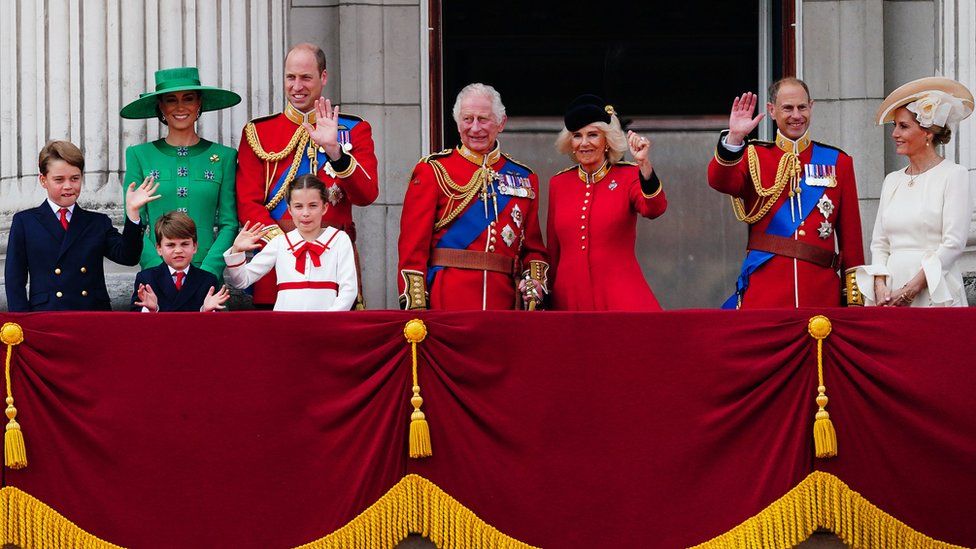
The Royal Household's official spending rose by 5% last year, to £107.5m, while its funding from taxpayers remained at £86.3m, annual accounts have revealed.
This meant drawing on reserves for what royal officials called an "exceptional period of transition" following Elizabeth II's death.
It was also confirmed the Duke and Duchess of Sussex have vacated Frogmore Cottage, in Windsor, Berkshire.
The accounts also show royal heating is kept at 19C - to cut energy use.
To help save the planet as well as bills, the accounts report a "concerted effort" by staff in royal residences to set the winter heating to 19C, while any empty rooms were kept at 16C.
The running costs of the monarchy - such as for official visits and residences - are funded by the "Sovereign Grant", currently calculated as being 25% of the profits of the Crown Estate.
The annual accounts for 2022-23 show this funding was £86.3m, the same as the previous year.
But spending was almost £21m higher than the Sovereign Grant, with palace officials attributing the extra costs to:
- the continuing renovation of Buckingham Palace
- extra expenses for the queen's funeral
- the King's accession
- rising inflation
The 10-year £369m project to repair Buckingham Palace had £34.5m allocated this year.
"Virtually no-one" was living in the palace, royal officials said, although staff might stay there on a temporary basis for events.
But the King and Queen Camilla planned to live there once building work was complete, in a few years from now.
The officials gave no further details of plans for Frogmore Cottage.
The Duke of York remains in Royal Lodge, in Windsor, but they would not comment on his leasing arrangements.
On average, about 500 Royal Household staff were being paid by the Sovereign Grant during the year - and there were questions about efforts to increase diversity, with the proportion belonging to ethnic minorities, 9.7%, showing no change since last year.
Royal staff received training under a "diversity and inclusion strategy", with concerns having been raised after black British charity founder Ngozi Fulani faced repeated questions about where she was "really from", at a Buckingham Palace reception.
The public funding also covers the cost of official royal travel and visits, which included:
- more than £1m on 179 helicopter journeys
- almost £32,000 when the King used the royal train for a two-day tour from Ayr to Manchester
- £187,000 for the then Prince of Wales' visit to Rwanda for the Commonwealth Heads of Government Meeting
- £146,000 for the King's tour of Germany on his inaugural state visit as monarch
But most of the visits were much more low-key, with:
- 2,700 engagements through the year
- 95,000 guests attending events in royal residences
Paying visitors to royal residences helped to offset some of the costs, with £9.8m in income earned - still less than half the pre-Covid levels.
The queen's death, last September, saw the Palace receiving an unprecedented level of correspondence, including messages of condolence, with 183,000 items arriving in the post.
In separate accounts, the Duchy of Cornwall reported profits of about £24m, in a transitional year that saw the new Prince of Wales replacing his father as the recipient.
'True cost'
Keeper of the Privy Purse Sir Michael Stevens said the annual finances covered an unprecedented "year of grief, change and celebration".
As well as events including the Platinum Jubilee, the queen's death and the King's accession, he said, the Royal Household "has not been immune to the impacts of the joint challenges of the pandemic and inflationary pressures, which have resulted in a flat Sovereign Grant".
But anti-monarchy group Republic said the royals were increasing their spending while "public services are being squeezed".
Income from the duchies of Cornwall and Lancaster should go to the state, it says, while additional costs such as policing are not included in the annual accounts.
"The royals have long hidden their true cost, which we have worked out to be at least £345m," Republic chief executive Graham Smith said. "That's enough to pay for 13,000 new nurses or teachers."


Read the latest from BBC News royal correspondent Sean Coughlan - sign up here.

https://news.google.com/rss/articles/CBMiJmh0dHBzOi8vd3d3LmJiYy5jby51ay9uZXdzL3VrLTY2MDQ1NDQ30gEqaHR0cHM6Ly93d3cuYmJjLmNvLnVrL25ld3MvdWstNjYwNDU0NDcuYW1w?oc=5
2023-06-28 23:11:35Z
2194215057
Tidak ada komentar:
Posting Komentar